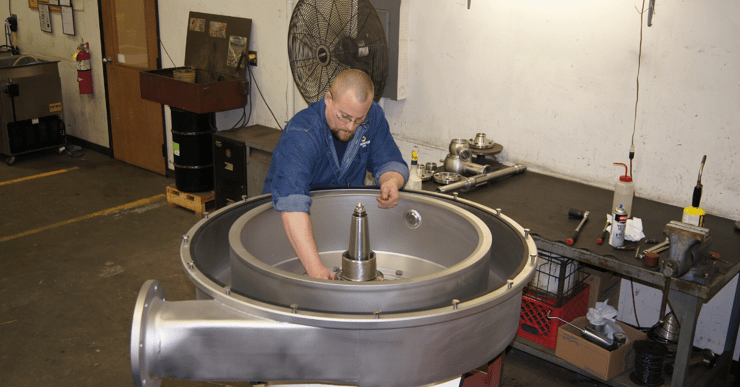When routine maintenance needs go unnoticed or unattended, larger issues with equipment can result. Oftentimes, problems that become serious and require immediate attention could have been prevented by thorough centrifuge maintenance.
So here’s what you need to know about upkeep and maintenance to hit your production volumes while also preventing a catastrophic event.
Stick to a service schedule
At Separators, we have found that the following maintenance schedule helps keep our clients up and running at their expected production volume, without creating too many downtime disruptions.
Minor service — Recommended every 6 months, minor service focuses on looking at the inside of your centrifuge bowl for worn parts and other red flags that could lead to downtime in the near future.
Major service — Recommended once a year, this service includes everything we do in a minor service, plus a full inspection of your frame and high-value parts.
If you’ve never worked with Separators before, we’ll start with a major service so that you can get an understanding of the current condition of your centrifuge bowl and frame. From there, we can list out our recommendations and replace parts that require repair. Generally, if we identify a part on your centrifuge that won’t make it through the next 12 months, we’ll opt to replace it to help you avoid unexpected downtime.
Be proactive about stocking spare centrifuge parts
We know that your plant doesn’t have a ton of storage space — but it’s well worth it to set aside a few shelves to store essential spare centrifuge parts, including gaskets, extra discs, and even a minor service kit. When you have these parts at your disposal, you can fix issues in the moment (such as an extra disc to your bowl, versus trying to accommodate inconsistencies in your product).
At Separators, we’ll keep a Bill of Material (BOM) kit on hand for your equipment to help make sure we have what you need in the event that maintenance is required at the drop of a hat.
Use service visits to train your staff
Our team’s technicians partner with your maintenance staff to educate and help grow their skills. During our minor and major services, we encourage your staff to shadow our technicians to learn more about the inner workings of your centrifuge (and how to identify warning signs that something isn’t working properly).
Extend equipment life
Whether you're looking to improve your separation process, optimize your flow rate, or extend the life of your equipment, maintenance is a large part of the answer. Taking care of your equipment makes it possible to get many more years of productive life out of it.
Avoid emergency maintenance
Keeping your equipment well-maintained can prevent potentially dangerous situations and emergency service visits. Because you won't have to stop processing unexpectedly, you won't lose nearly as much production time to a maintenance visit as you would to emergency service needs. In this way, preventing emergency centrifuge service can save you a lot of time and money in the long run.
In order to further illustrate the importance of maintaining your equipment, we put together a video focusing on the three areas of maintenance in response to our customers' questions on centrifuge upkeep:
Give your uptime an edge
We are all busy. Separators understands that — but we highly encourage you to never overlook your preventative maintenance (PM). Putting off maintenance to uphold your machinery and stay on top of things can lead to a catastrophic failure, and nobody wants that.
When you work with Separator’s centrifuge experts consistently, we can keep track of your equipment’s history and help you budget for big repairs down the road.

